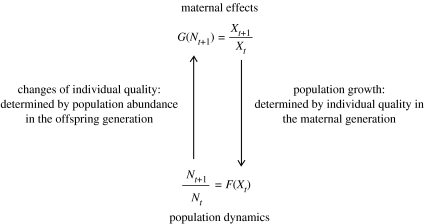Figure 1.
Feedbacks between population growth and changes in individual quality implied in the maternal effects hypothesis. In contrast to traditional kinetic approaches in population ecology where , population abundance affects the growth rate through changes in individual quality, which in turn determines the abundance of offspring generation. These dependencies induce an inertial effect (equation (2.2)), whereby the current population growth rate depends on the growth rate at the previous generation . Cycles require two interacting variables; it is either two species or quantity and quality, as in the maternal effects case.

